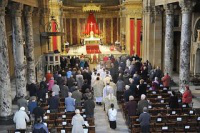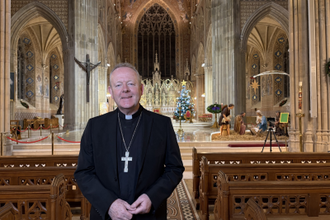Why was Newman so great?

Entry procession Birmingham Oratory
Birmingham Oratory’s Day of Prayer for Newman on Saturday saw the Auxiliary Bishop of Birmingham, Bishop Robert Byrne, preaching about Newman’s greatness.
The bishop began by referencing Blessed John Henry Newman’s funeral which is widely known to have attracted 20,000 people lining the streets around the Oratory to pay him their respects.
“Why did 20,000 people turn out to pay their respects to a nearly 90 year-old Cardinal of the Roman Church?” the bishop asked. “I believe quite simply that the reason was that the people of Birmingham and beyond recognised that Newman was a saint.”
And where did Newman’s greatness lie? Bishop Byrne highlighted a few of Newman’s many gifts:
He was a great pastor – caring for the sick and the dying – accompanying people on their spiritual journey through his prolific letter writing and personal influence and offering practical help and support to the people of his parish.
He is a great teacher of the faith. “His sermons are not only masterpieces of English prose,” Bishop Byrne said, “but also profound reflections on the Christian faith. They deal with the perennial problems of people grappling with faith, striving for holiness and living in charity with others. They are as fresh and as relevant in our modern age as they were in his own day.”
“Newman is truly a teacher of the New Evangelisation. He reminds us that our faith is at heart a living relationship with Jesus Christ.”
“In praying for the Canonisation of Blessed John Henry Newman,” the bishop concluded, “we are praying that the Universal Church will be given the gift of his wisdom and teaching that many more may grow in faith and love and that like him we may be drawn from shadows and images into the truth.”
Pope Francis sent a special message of support for the success of a ‘Day with Newman’ on Saturday. His Holiness imparted “his Apostolic Blessing upon all those persons who are participating in this significant event and working in any way for the Canonisation of the Blessed John Henry Newman.”
Bishop Robert Byrne's full homily text follows:
Mass for Newman’s Canonisation
Birmingham Oratory
11th October 20014
It is a well-known fact that at the funeral of Blessed John Henry Newman 20,000 people lined the roads around the Oratory to pay him their respects – this was quite an achievement and one which even today would provoke media comment. The question we should ask of course is why 20,000 people turned out to pay their respects to a nearly ninety year old Cardinal of the Roman Church?
I believe quite simply that the reason was that the people of Birmingham and beyond recognised that Newman was a saint. Like all saints, the Cardinal’s life and witness to Christ made him strangely fascinating. Most people are attracted by great men and women as we have witnessed in our own day in the lives of St John-Paul II and Blessed Teresa of Calcutta.
Blessed John Henry was recognised even in his own day and certainly in our own as a great teacher and champion of the faith. Whilst it is wrong to run ahead of the judgement of the Church as to the sanctity of any man or woman, the judgement comes normally as a final confirmation, a seal of approval on something that has been long known by the faithful. The formal canonisation of a saint and in the case of our Cardinal his proclamation as a Doctor of the Church will be a recognition of the mind of those 20,000 people and countless others from many parts of the world since his death in 1890.
So where did Newman’s greatness lie? Why did those 20,000 people believe him to be a saint? Some say it is because Newman was a great pastor as indeed he was. Both as an Anglican and a Catholic he was assiduous in his care of souls. At Littlemore he was remembered for years as the Vicar who visited the sick, cared for the dying and even bought the children of his parish a pair of shoes each. As a Catholic too here in Edgbaston he cared for those in the parish and had a special role in accompanying people on the spiritual journey, through his prolific letter writing and personal influence – which also marks him as a true son of St Philip.
Although Newman was a great pastor at the same time and throughout his life he had a distinctive and profound influence on the lives of many is as a great teacher of the faith. This he did through his many writings most of which were written to answer a specific need and his letters which were often written to those in spiritual need. It is probably above all as a preacher that Newman is above all a teacher and doctor of the faith. His sermons are not only masterpieces of English prose but also profound reflections on the Christian faith. They deal with the perennial problems of people grappling with faith, striving for holiness and living in charity with others. They are as fresh and as relevant in our modern age as they were in his own day.
For Blessed John Henry our Christian life is a continual journey of conversion for him conversion was not an event in his life but a quality of his life. For him conversion is part of the ongoing search for truth which compels us to change continually. His life reflects this as we read in the Apologia that from the age of fifteen there took place in him, he writes, a conversion to Christian faith which writing as a Catholic priest in his sixties of he was still certain. Newman’s conversion to the Catholic faith in 1845 was as he said himself a part of the ongoing conversion or journey of faith in which every Christian engages. “I was not conscious of firmer faith in the fundamental truths of revelation or of more self-command; I had not more fervour; but it was like coming into port after a rough sea.” So he keenly perceived that faith is real not abstract. It is more than something in the head, a mere notion or a philosophy or on the other hand a feeling, a sentiment, a taste, or some kind of improving hobby. Newman himself said that he had spent his life fighting against what he called “liberalism in religion” which sees religion as having no objective truth. One religion is seen to be as good as another, one view no better or worse than another. Newman saw that the effect of such an outlook leads to a complete loss of any faith and the inability to grow. If there is no truth then we do not strive to that which is beyond and outside us; we reduce God to our own size and needs. Unflinching fidelity to the truth as revealed in the conscience and enlightened by the Gospel caused Newman to enter the Catholic Church which also involved him in some of the battles and controversies of his life such as the dispute with Kingsley and his involvement in the Achili trial. Lesser men would have looked to see which way the wind was blowing.
Newman is truly a teacher of the New Evangelisation. He reminds us that our faith is at heart a living relationship with Jesus Christ. Like Pope Benedict he reminds us of the dangers of relativism and the beauty of holiness. I believe that his life and writings are a powerful instrument of the New Evangelisation because they spring from a deep personal faith and the all-important encounter with the living God and His revelation in Jesus Christ. At the heart of our faith as Newman understood, is a real assent, a certitude about the things of God, a communion with what he called “the unseen world”, in which Christ, our Lady, angels and saints, heaven and hell are present as if they were objects of sight, a religion of persons of the facts of faith and of devotion. Newman teaches us to love our faith and the Church as the divinely instituted society through which we are taught in the name of Christ.
In praying for the Canonisation of Blessed John Henry Newman we are praying that the Universal Church will be given the gift of his wisdom and teaching that many more may grow in faith and love and that like him we may be drawn from shadows and images into the truth.















